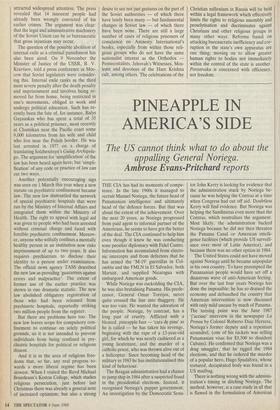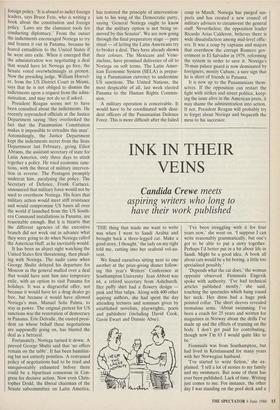PINEAPPLE IN AMERICA'S SIDE
The US cannot think what to do about the
THE CIA has had its moments of compe- tence. In the late 1960s it managed to recruit Manuel Noriega, the future head of Panamanian intelligence and ultimately head of the defence forces. But that was about the extent of the achievement. Over the next 20 years, as Noriega progressed from paid agent to informal partner of the Americans, he seems to have got the better of the deal. The CIA continued to help him even though it knew he was conducting sone peculiar diplomacy with Fidel Castro. Information has accumulated from elecro- nic intercepts and from defectors that he has armed the 'M-19' guerrillas in Col- ombia and the FMLN in El Salvador, both Marxist, and supplied Nicaragua with embargoed American goods.
While Noriega was cuckolding the CIA, he was also brutalising Panama. His prede- cessor, General Omar Torrijos, never quite crossed the line into thuggery. He was too vain. He wanted the adoration of the people. Noriega, by contrast, has a long past of cruelty. Afflicted with a bloated, pineapple face — `cara de pina' as he is called — he has taken his revenge, beginning with the rape of a 13-year-old girl, for which he was nearly cashiered as a young lieutenant, and the murder of a catholic priest, who was thrown alive out of a helicopter. Since becoming head of the military in 1983 he has institutionalised this kind of behaviour.
The Reagan administration had a chance to jump ship in 1984 after a suspected fraud in the presidential elections. Instead, it recognised Noriega's puppet government. An investigation by the Democratic Sena- tor John Kerry is looking for evidence that the administration stuck by Noriega be- cause he was helping the Contras at a time when Congress had cut off aid. Doubtless Kerry will find evidence. But Noriega was helping the Sandinistas even more than the Contras, which neutralises the argument. Most likely, the administration backed Noriega because he did not then threaten the Panama Canal or American intelli- gence facilities (which provide US surveill- ance over most of Latin America), and because there was no other option in 1984.
The United States could not have moved against Noriega until he became unpopular in his own country. To have preempted the Panamanian people would have set off a disastrous wave of anti-American feeling. But over the last four years Noriega has done the impossible: he has so drained the economy and debauched the country that American intervention is now discussed with only mild unease by much of Panama. The turning point was the June 1987 Taccuse' interview in the newspaper La Prensa by Colonel Roberto Diaz Herrera, Noriega's former deputy and a repentant scoundrel, (one of his rackets was selling Panamanian visas for $3,500 to dissident Cubans). He confirmed that Noriega was a drug smuggler, that he rigged the 1984 elections, and that he ordered the murder of a popular hero, Hugo Spadafora, whose tortured, decapitated body was found in a US mailbag.
There is nothing wrong with the adminis- tration's timing in ditching Noriega. The method, however, is a case study in all that is flawed in the formulation of American foreign policy. 'It is absurd to indict foreign leaders, says Bruce Fein, who is writing a book about the constitution and foreign policy. 'Laws are the clumsiest tools for conducting diplomacy.' From the outset the indictments encouraged Noriega to try and brazen it out in Panama, because he feared extradition to the United States if he went into exile. When it emerged that the administration was negotiating a deal that would have let Noriega go free, the Senate voted overwhelmingly in protest. Now the presiding judge, William Hoevel- er, from the US District Court in Miami, says that he is not obliged to dismiss the indictments upon a request from the admi- nistration, and may not do so if asked.
President Reagan seems not to have been consulted about the indictments. He recently reproached officials at the Justice Department saying 'they overlooked the fact that the Panamanian Constitution makes it impossible to extradite this man'. Astonishingly, the Justice Department kept the indictments secret from the State Department last February, giving Elliot Abrams, the assistant secretary of state for Latin America, only three days to stitch together a policy. He tried economic sanc- tions, with the threat of military interven- tion in reverse. The Pentagon promptly undercut him, paralysing the policy. The Secretary of Defence, Frank Carlucci, announced that military force would not be used to overthrow Noriega. His fears that military action would meet stiff resistance and would compromise US bases all over the world if launched from the US South- ern Command installations in Panama, are reasonable enough. But it is bizarre that the different agencies of the executive branch did not work out in advance what they were going to do when Noriega called the American bluff, as he inevitably would.
It has been an abject sight watching the United States first threatening, then plead- ing with Noriega. The nadir came when George Shultz delayed his departure for Moscow as the general mulled over a deal that would have sent him into temporary exile, with an option to visit Panama for holidays. It was a disgraceful offer, not because it would have let a drug dealer go free, but because it would have allowed Noriega's man, Manuel Solis Palma, to stay in power. The original pretext for US sanctions was the restoration of democracy in Panama. Eric Delvalle, the ousted presi- dent on whose behalf these negotiations are supposedly going on, has blasted the deal as a betrayal.
Fortunately, Noriega turned it down. A peeved George Shultz said that 'no offers remain on the table'. It has been humiliat- ing but not entirely pointless. A restrained policy of negotiations had to be tried and unequivocably exhausted before there could be a bipartisan consensus in Con- gress for decisive action. Now even Chris- topher Dodd, the liberal chairman of the Senate subcommittee on Latin America, has restored the principle of intervention- ism to his wing of the Democratic party, saying 'General Noriega ought to know that the military option is not being re- moved by this Senator'. We are now going through the final preparatory stage — pure ritual — of letting the Latin Americans try to broker a deal. They have already shown their colours. The Mexicans and Vene- zuelans, have promised deliveries of oil to Noriega on soft terms. The Latin Amer- ican Economic System (SELA) is prepar- ing a Panamanian currency to undermine US sanctions. The United Nations, the most despicable of all, last week elected Panama to the Human Rights Commis- sion.
A military operation is conceivable. It would have to be coordinated with dissi- dent officers of the Panamanian Defence Force. This is more difficult after the failed coup in March. Noriega has purged sus- pects and has created a new council of military advisers to circumvent the general staff. Nevertheless, the opposition leader Ricardo -Arias Calderon, believes there is wide dissatisfaction among mid-level offic- ers. It was a coup by captains and majors that overthrew the corrupt Romero gov- ernment in El Salvador in 1979, reforming the system in order to save it. Noreiga's 70-man palace guard is now dominated by foreigners, mostly Cubans, a sure sign that he is short of friends in Panama.
It is now up to the Panamanians them- selves. If the opposition can restart the fight with strikes and street politics, keep- ing the issue alive in the American press, it may shame the administration into action. If not, President Reagan will probably try to forget about Noriega and bequeath the mess to his successor.



















































 Previous page
Previous page